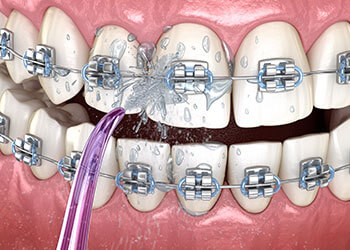Also known as water piks or oral irrigators, water flossers can simplify the process of dental flossing so that you can improve your dental hygiene. Flossing is a very important aspect of oral hygiene but because it requires some technique, many patients neglect to do it as often as they should. Using a water flosser offers a number of benefits to patients so you can be more effective at keeping your mouth clean. Let’s take a look at some of the pros (and cons) of a water flosser vs string floss so you can make an informed decision on the best approach for your needs.
How Do Water Flossers Work?
Water flossers work by shooting jets of water at the spaces between your teeth. By doing this, a water flosser can remove debris, stuck food and plaque from between and on the surface of your teeth. If you do not floss and remove this debris, it will turn into tartar or calculus, a hard substance that only your dentist can remove with special tools.
It’s important to manage plaque levels because they can cause infection and tooth decay which, if left untreated, ultimately leads to tooth loss and gum disease. In addition, research indicates that oral infections are associated with other health issues, such as heart problems, so it’s important to manage the levels of infection in your body through sound dental care.
Water Flosser vs String Floss: What’s The Difference?
When you perform traditional flossing, the string floss is wrapped around each tooth in the shape of the letter C, with your fingers holding onto the string. If you use a water flosser, you simply aim the jets of water in the direction you want them to go: along your gum line and between and behind each tooth.
What Are The Pros Of Water Flossers?
Get Those Hard-to-reach Places
Water flossers spray streams of pulsing water into the spaces that your toothbrush can’t reach, including around and between the teeth at the back of your mouth.
Do More Thorough Cleaning
When you use traditional flossing methods, the effectiveness of your technique depends on the level of attention you pay and the time you have available. Using a water flosser is a consistent way to ensure your mouth is as clean as possible.
People Who Wear Braces Can Floss Just As Well
Patients who wear orthodontic braces have a much trickier time of keeping their mouths clean, because of the small spaces that are created between the brackets, wires and teeth. Water flossers allow you to get into those awkward spaces and do a good job at flossing in a relatively short period of time.
Kids Can Floss Too
Getting used to working with string is an art when you do traditional flossing, and that means it can take children quite a while to know how to do it. This can be at the expense of their dental health, so a water pik can be a valuable bridging tool that takes care of dental hygiene while they ‘learn the ropes’ of string flossing.
People Who Have Conditions Affecting Their Hands Can Floss
Patients who experience issues such as carpal tunnel syndrome or arthritis may find it especially challenging to floss with string. The discomfort may put you off flossing, or you may not do it as effectively as you could using an oral irrigator.
People Who Have Sensitive Gums May Benefit

If you are still learning how to use string floss and have sensitive gums, the string can cause irritation resulting in bleeding. Water flossers offer a much gentler approach to plaque removal for people whose gums are prone to bleeding.
String floss was originally conceptualised using strands of silk, and later nylon. Today it is available in different flavours and thicknesses, and patients can choose between waxed and unwaxed varieties based on their preferences. Even though there is so much choice in traditional flossing products, you may find it more comfortable to use a water flosser to clean in those hard to reach spaces.
What Are The Cons Of Water Flosser Vs String Floss?
Water Flossers Are More Expensive Than String Floss
Buying a water pik will cost you more than some string floss but it offers the benefits listed above in return for your investment.
It Takes Some Getting Used To
It might take you a few attempts before you get used to your oral irrigator, and the angle that it should be held at to clean plaque from your teeth. You might also take a while to get used to the spray of water jets that come out of the device, but it shouldn’t take too long to start enjoying the convenience.
It Might Be A Bit Messier
Jets of water make more of a mess than string floss, but if you use your water pik over the basin and look at your reflection in the mirror, it is manageable.
Floss Like A Pro: Tips To Help You Out
The research shows that it doesn’t matter if you use water flossers before or after brushing, as long as you do it properly.
Don’t forget to rinse your mouth after flossing, to ensure all the debris is removed from your mouth.
Don’t neglect your tongue in your oral care, it can harbour lots of bacteria and needs to be cleaned like your teeth.
To find out more about the benefits of a water flosser vs string floss, please contact us for an appointment: (02) 8806 3799.









